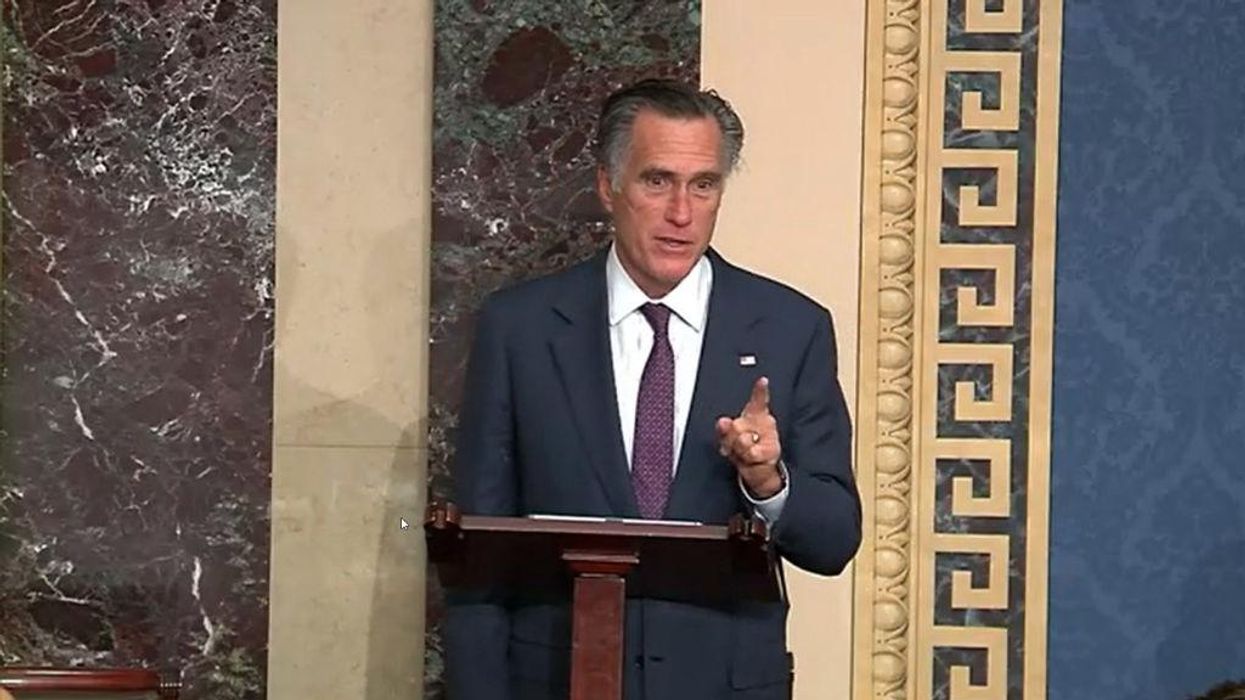
© 2026 Blaze Media LLC. All rights reserved.
Sen. Mitt Romney proposes $350 per child monthly payments to families
February 04, 2021
New welfare program
Sen. Mitt Romney (R-Utah) will introduce a plan to create a new welfare program Thursday, granting parents of young children $350 per child every month in perpetuity — not just during the coronavirus pandemic.
Romney announced his proposal, called the Family Security Act, in a news release that touted the program as "a new national commitment to American families by modernizing antiquated federal policies into a monthly cash benefit."
"American families are facing greater financial strain, worsened by the COVID-19 pandemic, and marriage and birth rates are at an all-time low," Sen. Romney said. "On top of that, we have not comprehensively reformed our family support system in nearly three decades, and our changing economy has left millions of families behind. Now is the time to renew our commitment to families to help them meet the challenges they face as they take on most important work any of us will ever do — raising our society's children. This proposal offers a path toward greater security for America's families by consolidating the many complicated programs to create a monthly cash benefit for them, without adding to the deficit."
Romney's plan calls for the Child Tax Credit to be abolished and replaced with a flat monthly government payment of $350 per child to families with children ages 0 to 5 and $250 per month for children ages 6 to 17. The program is available for every child with a valid Social Security number as well as expecting parents within four months of their child's due date, according to a fact-sheet on Romney's policy from the Niskanen Center.
The maximum monthly payment to families would be capped at $1,250 per family, and to ensure the policy doesn't benefit the rich, for every $1,000 above $200,000 income for single tax filers and $400,000 for joint filers, the payments would decrease by $50 until phasing out to zero.
Romney's office claimed his proposal could lift nearly 3 million children out of poverty, encourage people to marry and have children, and do so without increasing the federal budget deficit.
Under current policies, the Child Tax Credit and the Earned Income Tax Credit cost the federal government $188 billion. Under Romney's proposal, that spending would increase to $254 billion.
To offset the additional spending, Romney proposes eliminating the Head-of-Household tax filing status, eliminating the Child and Dependent Care tax credit, abolishing Temporary Assistance to Needy Families benefits, and repealing the State and Local Tax deduction in the tax code. These programs, Romney's office said, are duplicative and redundant and families will receive more benefits from a flat check than from tax loopholes they may lose access to if their income goes up.
While Democrats generally support expanding welfare programs and government payments to families, they are not likely to support Romney's plan because of the provisions eliminating tax credits they favor.
As part of the $1.9 trillion coronavirus relief package proposed by President Joe Biden, Democrats want to boost the child tax credit from $2,000 to $3,600 and make it "fully refundable," ensuring that parents who don't owe taxes still receive a payment from the government. The Democrats also want the Internal Revenue Service distribute the child tax credit refunds in advance every month, essentially creating a monthly government payment to families distributed by the IRS by manipulating the tax code.
Romney's proposal differs in that the Social Security Administration would distribute the payments, and the law would recognize these payments for what they are: Welfare checks for families, rather than tax loopholes. His plan also would provide $4,200 for families with young children, rather than $3,600. And where Biden's proposal is deficit-financed, the offsets supported by Romney would pay for his plan through 2025.
The Family Security Act is endorsed by the Niskanen Center, as well as the Universal Income Project and UBI Center.
Want to leave a tip?
We answer to you. Help keep our content free of advertisers and big tech censorship by leaving a tip today.
Want to join the conversation?
Already a subscriber?
more stories
Sign up for the Blaze newsletter
By signing up, you agree to our Privacy Policy and Terms of Use, and agree to receive content that may sometimes include advertisements. You may opt out at any time.
Related Content
© 2026 Blaze Media LLC. All rights reserved.
Get the stories that matter most delivered directly to your inbox.
By signing up, you agree to our Privacy Policy and Terms of Use, and agree to receive content that may sometimes include advertisements. You may opt out at any time.






